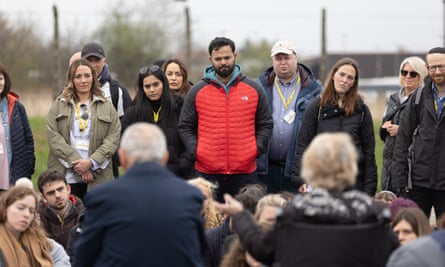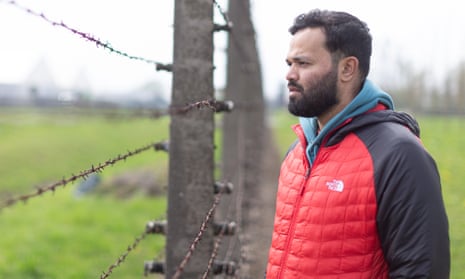On Wednesday morning Azeem Rafiq’s phone pinged as an email landed in his inbox from a professional sportsman – not a cricketer – seeking his advice about dealing with dressing-room discrimination. Messages like this are not uncommon for Rafiq these days, but the timing of this one was particularly poignant: he received it while he was in Auschwitz, contemplating the most violent and barbaric potential consequences of prejudice.
It is a little more than 18 months since Rafiq first spoke to the media about his experiences of racism at Yorkshire, setting off an explosive chain of events that has led to regime change at Headingley, a long overdue intensification of efforts to increase diversity in the county game, and the England and Wales Cricket Board being ordered to “get its house in order” by the sports minister, Nigel Huddleston. The revelations have also been transformative for Rafiq, turning him from a relatively obscure former cricketer into a public figure and campaigner against discrimination.

“I feel like I’ve been handed this responsibility where a lot of people get in touch with me across the spectrum, from different sports,” Rafiq said that day. “I know what it was like when I was on my own looking for help and no individual wanted to help me and no organisation wanted to help me. I know how it felt to be completely left on my own and I can’t do that to someone else, as much as it takes a lot out of me every time I speak to someone.
“I’m just a normal person from Barnsley and I haven’t really got the tools to help everyone, but it won’t be through lack of trying. One thing I’m not prepared to do is look the other way, because I know how close I came to me taking my own life and in my head I can’t think that someone might get in touch with me and I don’t help them and that takes them over the edge. I feel like I’ve been handed a responsibility from Allah and I’ve just got to fulfil it.”
The trip to Poland was the result of just one grain in a sandstorm of unexpected consequences that followed Rafiq’s sudden rise to prominence. In November, while the 31-year-old was speaking to the parliamentary DCMS committee about his experience of racism, the Times published a decade-old text exchange between him and another cricketer, Ateeq Javid, in which he suggested a third player’s reluctance to spend money at a team dinner amounted to behaving like a Jew. He immediately apologised to the Jewish community and promised to “take time to understand and learn and educate myself”.
“I don’t want to downplay the messages in any way,” he says now. “They were hurtful, they hurt people, and I got the backlash from that and deservedly so.”
The sincerity of his promise to educate himself can be measured in the number of Jewish community organisations whose names now crop up in conversation. Within days he had been taken to a synagogue in London where he met Lily Ebert, a 98-year-old survivor of Auschwitz, and heard for the first time about the Holocaust.
Later he was asked to participate in the March of the Living, an annual walk between the original labour camp at Auschwitz and Auschwitz-Birkenau, site of the murder of 1.1 million people between 1942 and 1945, a few kilometres away. This year’s walk took place on Thursday, with 3,000 people taking part, and Rafiq had also spent the preceding couple of days visiting notable sites across Poland with a small group of British multi-faith leaders. The Observer was invited to join them.

“I can’t remember ever studying the Holocaust in school,” Rafiq says. “When I started playing cricket academic work wasn’t something I paid that much attention to. I don’t know what stage of school this is taught but I don’t remember it at all. I’d genuinely never heard of it before I met Lily Ebert. I’m embarrassed to say that because everyone kind of goes: ‘Are you sure, mate?’ But I genuinely hadn’t.
“But like they say, once you listen to a witness you become a witness. That’s the responsibility of all of us who have come and learned about it to encourage other people to learn about it.
“It’s not for everyone to come here, but to learn about Jewish life, Jewish history, what they went through as a community and what they continue to go through, if that doesn’t move you there’s something wrong with you.”
The trip was physically and psychologically draining and made still more testing for Rafiq by its timing towards the end of Ramadan. One day, having woken in Warsaw, the group visited Chachmei Lublin Yeshiva, a Jewish seminary opened in 1930 when around 40,000 Jews lived in the city of Lublin – 1,200 are believed to have survived the Holocaust, 650 live there now, and beyond international visitors most current activity seemed to centre around the distribution of food and clothing to Ukrainian refugees – and the nearby Majdanek concentration and extermination camp.
We continued to Markowa, a village of a few thousand inhabitants where, in 1944, as punishment for sheltering a group of Jews, a Catholic couple, Jozef and Wiktoria Ulma, and their six children were executed. It now houses an excellent museum dedicated to the Poles who risked or lost their lives attempting to save members of the country’s Jewish community.
We continued to the Buczyna forest, just outside the city of Tarnów, where 10,000 people were murdered, mostly by shooting, and buried in mass graves between 1942 and 1943.
The day concluded, 600km and 16 hours after it began, at the Jewish Community Centre in Krakow, home of 70,000 Jews in 1939 and a few hundred today, which has also been largely repurposed to distribute aid to Ukrainian refugees.
The experience was emotional, provocative and often inspiring, but there was little to raise the spirits. “As difficult and heartbreaking an experience as this has been, I’d encourage anyone to come,” Rafiq says. “I’m absolutely shattered by it, but it’s important to imagine being here as a Jewish person, having family who were killed, seeing the piles of hair.
“At Auschwitz they had books with the names of four million known victims and I saw young people looking through them for their family members. I have a lot of respect for them being here at that age and going through all of that.”
Walking through sites where the process of murder was perfected and industrialised it can be hard to know how it is appropriate to act and what it is appropriate to feel. “With me fasting I was getting really tired and hungry, but we were walking through places – a wall where people got shot, rooms full of women’s hair –and you’re aware that people went days and days without anything, in pain, and with death right in front of them,” Rafiq says. “It’s so difficult to put in any sort of words, but when you’re there it just hits you and hits you pretty hard.
“A lot of it I still can’t quite process on a human level at all. I just can’t get out of my head where everyone else was. We were lucky enough to meet another survivor, Arek Hersh, and listen to his experiences. He was 11 years old when it started and he went through four and a half years of that. Where were people? It’s hard to process and understand at this stage. And we’re here, learning about an atrocity that took place all those years ago, and we’ve bumped into groups of Ukrainian refugees. It just feels like it’s right on our doorstep again and what are we doing?”

Throughout his time with March of the Living, Rafiq was treated as something of a celebrity, regularly being pulled away to film a video or pose for a photograph. This was particularly remarkable given that the other participants were overwhelmingly Jewish and he was only there because of his ignorant use of an antisemitic trope. The warmth of his reception was evidence of the sincerity of his response to that story and a reaction to the generosity and humility that is apparent to those who spend time with him, but all this attention was occasionally uncomfortable.
“In my ideal world no one would have found out I was here,” he says. “But ultimately I want the cause I’m fighting for to be at the forefront, and for that I’ve got to put myself out there, even if it’s way out of my comfort zone.
“I had someone from disability cricket come up to me the other day and just say: ‘I don’t think you realise how much of a difference you’ve made to my life.’ I’ve had parents contact me about the opportunities their kids are getting now. Coaches, administrators.
“That means a hell of a lot and it’s something I can look back on with some sort of pride. But I know with these things in the short-term there can be a lot of energy and slowly it sort of wilts away. I’ve been given a platform, and it’s important that I use that platform and make sure that not only cricket but other sports and society as a whole knows these things are not going to be acceptable any more.”
In the study of the Holocaust those involved have often been split into three groups: victims, perpetrators and bystanders, those who had seen or heard what was taking place but did nothing to stop it. On an incomparably smaller scale, Rafiq recognises the same classifications in his own experience of prejudice.
“In my case it was the bystanders who hurt the most,” he says. “The bystanders were my mates. Bad things happen when good people do nothing and too many bystanders are the reason why things happen that shouldn’t.
“In the last couple of days we’ve seen the extreme of discrimination, but let’s not shy away from the fact that these things have happened and they continue to happen. We’ve got to do more than just look after ourselves. There’s no way I can just go: ‘Oh well, my issue’s sorted so everything’s fine.’ I’m not built like that – unfortunately for the system.”
